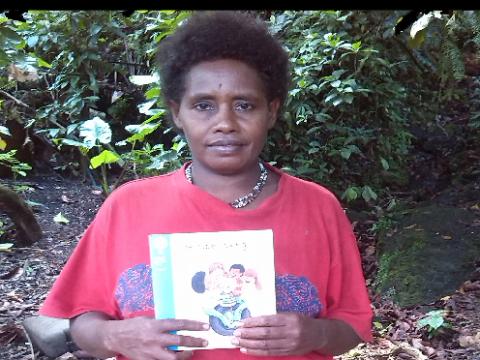World Vision, improving literacy in Solomon Islands

Four years ago, Martha could not read, write or speak in Pijin.
“When I was a child I went up to class six in school but I did not understand anything,” said Martha.
Today, Martha is literate, and has the ability to read to her children in English as well as in Pijin, thanks to World Vision’s Solomon Islands Education Project.
She is one of the many women, men and youth in 12 communities, who have benefitted from the literacy project in South Makira.
Over a four-year period, 23 community volunteers were trained by World Vision to teach students to read and write in the local Rawo dialect, in Pijin and in English, using materials developed by the Literacy Association of Solomon Islands (LASI).
A recent evaluation of the World Vision project found that between 2012- 2016, literacy rates increased by around 32% in target communities, with the project reaching 499 people.
By improving literacy, the project increased the capacity of beneficiaries to improve their lives by accessing further livelihood training, with 56% of respondents enrolling in other forms of training.
The evaluation also found a 43% increase in the number of parents who felt they were able to provide well for their children, after the project.
Participation by women was also high, with the evaluation finding that 73% of literacy students were female.
Since she began working with the Education sector for World Vision, Margi Martin has heard many stories from participants in the literacy project.
"One man from South Makira told me that he would always run away and hide when visitors came to the village,” said Margi.
“He did not speak Pijin or English. When literacy and livelihoods classes began, he saw it as a light of hope for him. He attended classes for three years even though he was criticised by his wife and children.”
“He told me that through literacy he is now empowered. He is confident to speak with visitors and he hopes he can learn new livelihood skills that will help him and his family to meet their needs.”
Temotu
In Temotu, World Vision’s Temotu Literacy for Livelihood Project is working in 15 communities in the Reef Islands and Santa Cruz Islands.
With two classes per week – students are taught how to read, write, sound letters and even how to hold a pen. Students, mostly mothers, also have the opportunity to learn life skills like sewing, weaving and dying cloth, activities which can be turned into income generating activities.
George Nonyi is a volunteer literacy teacher at the Kala Bay Literacy School
“For a lot of people, the literacy school is their first experience of school and its impact on their lives is huge,” said George.
“Being literate is their main path towards participating in economic, social and educational activities in their community.”
“It’s a great feeling to see the people you train now able to read and take part in church activities,” said George.
Although true literacy rates in the Solomon Islands are unknown, a study conducted in 2012 by the World Bank suggests that they may be as low as 7-17%.
International Literacy Day
On September 8, 2016, World Vision Solomon Islands will join other partners to mark World Literacy Day.
“Literacy has long been recognized as a powerful accelerator of sustainable development in areas such as health and agriculture, and World Vision is committed to projects, which support health and livelihoods in communities,” said World Vision Country Director Janes Ginting.
Studies have shown that youth and adults who are literate engage more with their community and are less likely to have problems with substance abuse than those who do not. While the children of parents that cannot read or write often perform poorly at school and can themselves have trouble with literacy.
The Australian Government through the Australian NGO Cooperation Programme funds world Vision’s Solomon Islands Education project while the Temotu Literacy for Livelihoods project is funded by World Vision New Zealand and the New Zealand Government.